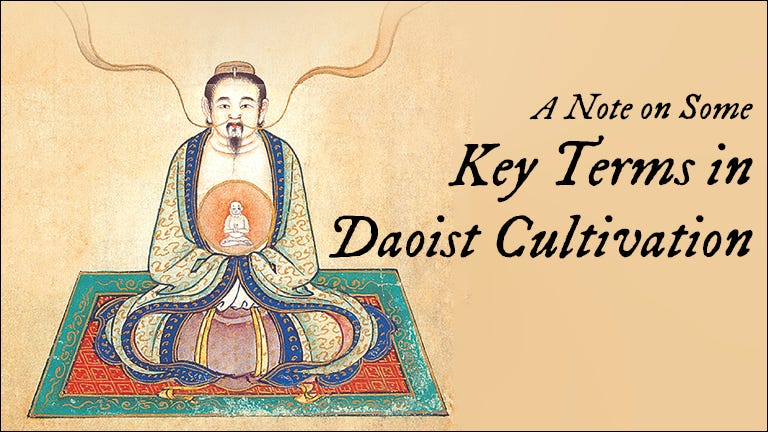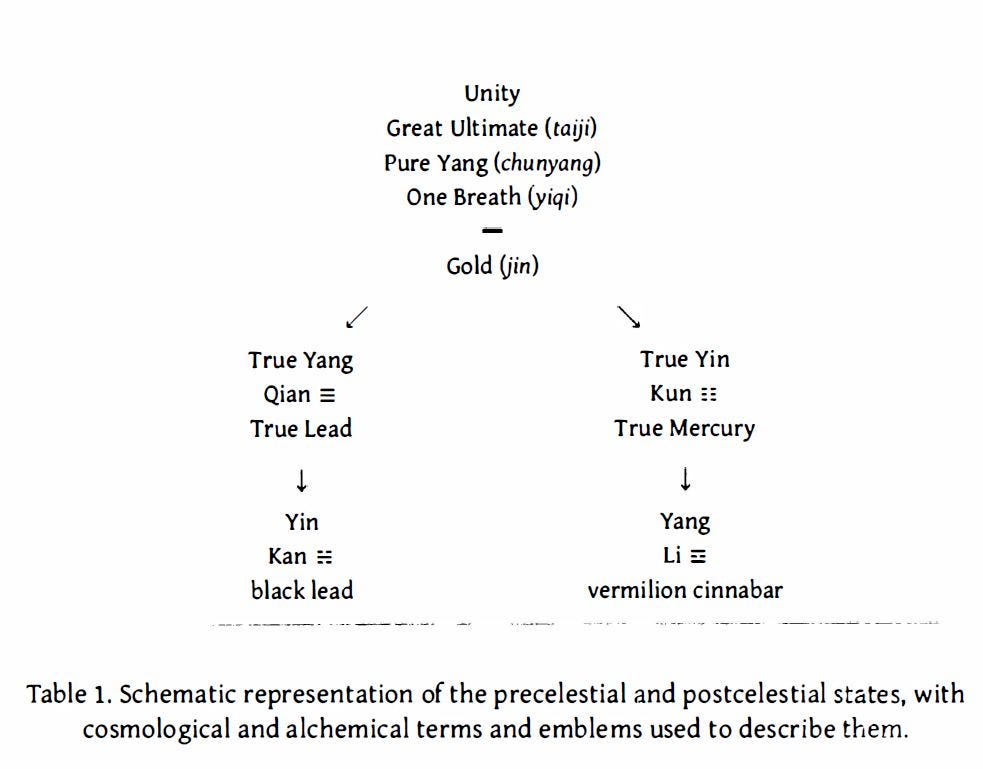The following is an excerpt from pg. 6-9 of Awakening to Reality: The “Regulated Verses” of the Wuzhen Pian, translated by Daoism scholar Fabrizio Pregadio. Awakening to Reality 悟真篇 is attributed to Zhang Boduan, who became a key figure in the Southern Lineage of Internal Alchemy (Neidan), and was written in the 11th century. I have added the Chinese text to the terms, as the original text only has pinyin.
The excerpt succinctly describes a few of the key concepts used in cultivation novels, including xiantian and houtian, the golden elixir (erroneously translated as golden “core” in the cultivation novel community), and the primal infant (erroneously translated in this community as “nascent soul”).
If you want to learn more about this stuff, I have a list for further reading after the excerpt and my final notes.
The Elixir 丹
Precelestial and postcelestial domains. At the basis of alchemy, and of other spiritual teachings, is the perception that the world exists in two fundamental states, the unconditioned and the conditioned ones. Whether this distinction “truly” exists is a question that internal alchemy approaches at an advanced stage (in particular, as we shall see, at the very last stage of its practice); the initial awareness of this distinction constitutes, nevertheless, the beginning of its path.
Using two traditional Chinese terms, the unconditioned and conditioned domains are respectively defined as precelestial (or prior to Heaven, xiantian 先天, lit. “before Heaven”) and postcelestial (or posterior to Heaven, houtian 後天, lit. “after Heaven”). The postcelestial domain is distinguished by multiplicity and relativity; it is the state that features transitory events and phenomena that succeed one another within space and time. The precelestial domain, in one of the approximations that might be used to describe it, is the constant and omnipresent original state of Oneness, which contains all events and phenomena independently of whether they do or do not occur, and with no distinctions of space and time, here and there, before and after.
In this view, the cosmos as we know it is the self-manifestation of the Dao 道, which first determines itself as Oneness. Primal Oneness contains Yin 陰 and Yang 陽 in their pristine state; the joining of Yin and Yang generates the world. To appreciate the details of this view, it is convenient to follow the example of the alchemical texts and describe it through the emblems of the Book of Changes. Qian 乾 ☰ (pristine Yang) and Kun 坤 ☷ (pristine Yin) are constantly joined to one another in the state of Unity. Being joined, Qian unceasingly bestows its essence to Kun, and Kun brings it to achievement; thus the world with its countless events and phenomena is generated. However, due to the very fact of being continuously joined to one another, Qian becomes Li 離 ☲ (Yang), and Kun becomes Kan 坎 ☵ (Yin).
Therefore the essence of the Yang principle in its pure state is now found within Kan. That principle, which is the One Breath of the Dao (the state of Unity represented by the undivided line), is what an alchemist seeks to recover.
“Inversion” and the generation of the Elixir. Alchemy offers a way to return to the state of Unity. In its view, the forward movement (shun 順, lit. “continuation”) from the Dao to the ten thousand things can be compensated by a reverse, backward movement (ni 逆, ” inversion”). The inversion process is represented in internal alchemy in several different ways, each of which uses different images and terms. The most common formulation refers to Essence (jing 精), Breath (qi 氣), and Spirit (shen 神). The Dao, which first self-manifests as pure Spirit, issues its Breath, which in turn coalesces into Essence, the seed that gives birth to the world. Human beings are composed with the same three elements. Accordingly, in its most typical codification, the alchemical process is based on the progressive refining of those components. The refining occurs in an inverted sequence, which reintegrates each component into the previous one:
(I) Refining Essence into Breath (lianjing huaqi 煉精化氣)
(2) Refining Breath into Spirit (lianqi huashen 煉氣化神)
(3) Refining Spirit and reverting to Emptiness (lianshen huanxu 煉神化虛)
The Elixir itself is also described with different terminology: it may be called the One Breath of the Dao, Pure Yang, Gold, Lead, and with literally dozens of other appellations. Liu Yiming (1734-1821), in a passage of his commentary to Awakening to Reality translated in the present book, writes that “there is no other Golden Elixir 金丹 outside one’s fundamental nature,” and that “every human being has this Golden Elixir complete in himself.” In his view, the Elixir is the essential, unchanging true nature of the human being; it has, fundamentally, no form and no name. However, one of the most widespread and best-known images used to represent the Elixir, also adopted by Awakening to Reality is that of an embryo 胎, an infant 嬰, or a child 子. When the Elixir is depicted in this way, the three stages mentioned above respectively correspond to the conception, the gestation, and the birth of an immortal infant. Its conception occurs in the lower Cinnabar Field (dantian 丹田), located in the region of the abdomen; its gestation, in the middle Cinnabar Field, in the region of the heart; and its birth, in the upper Cinnabar Field, in the region of the brain. At the end of the process, the child is described as exiting the individual from the top of his head. Neidan 內丹 texts refer to this event as the birth of a shen wai zhi shen 身外之身 , an expression that can be understood as “a body outside one’s body,” or as “a self outside one’s self.”
Final Notes
The term “primal infant” is called in the excerpt “embryo”, “infant”, or “child”. The actual term “primal infant” is 元嬰 (yuanying), and as far as I have been able to find out, it is a fictional term created by Huanzhu Louzhu in his wuxia novel Sword Xia of the Shu Mountains, which began publication in 1932. For most of the book he actually just calls it “infant”, but later on he adds the “primal” part. However as seen in the above excerpt, the concept is real in Daoism; it’s just that the specific term “primal infant” is a fictional creation, as far I can tell. I’ve seen claims that the term originated with the Wuliu School of Daoism. That is incorrect. As any quick search online through that school’s scriptures will show, the term yuanying does not appear in any of them. Instead, the texts refer to it as a “Dao embryo” (or fetus) 道胎.
There is also the 陽神 (Yang Spirit). The Yang Spirit is what it is called after the primal infant “comes of age” and emerges from the top of the skull (what the above excerpt refers to as “the body outside one’s body”). In the Tang dynasty scripture, Scripture of the Nine Immortals and the Perfected Dragon and Tiger 真龍虎九仙經, it is called the “sacred embryo” instead of infant, and in that text it says that after it is complete and is moving about outside the body, it casts no shadow (because it is made of pure yang qi), and so in order to blend in with ordinary people, it wears clothes and a cap so that it will cast a shadow. So it is not an ethereal soul like some see-through ghost, but is visible and has material form.
The word “elixir” is important in Daoism of course because the entire practice of cultivating to immortality incorporates alchemical terminology. Elixir translates 丹 (dan) and is often called Golden Elixir. The word actually means “cinnabar” (note the Chinese text of “cinnabar field” above”. Cinnabar is one of the main ingredients used in external alchemy. Back then, adepts would take cinnabar, lead, mercury, realgar, opriment, alum, gold, silver, and other materials and prepare them and combine them in a reaction vessel and heat that up over an open flame for a prescribed amount of time according to a very specific ritual order.
An efflorescence of the resulting sublimation would collect on the inner ceiling of the egg-shaped vessel, which could then be scraped off and eaten off the spatula or made into pills for use later. Elixir dan is often translated as “pill” in cultivation novels, but that is incorrect. The form it’s taken in is often a pill form, but the word does not mean pill. It means cinnabar, and because of cinnabar’s importance in the alchemical process, but synecdoche it means “elixir”.
Xiantian and Houtian as said above, refers to before and after the heavens were created. So xiantian (precelestial) means the Dao before it degenerated into heaven and earth and houtian is the world we live in now. In modern Chinese usage, these words refer to something that is innate vs something that is learned. Some translators, unfortunately, translater it that way, but that usage is not what is meant in a cultivation context. So innate, connate, inborn, congenital, etc., are inappropriate translations for xiantian in a cultivation context.
One final note about the “inversion” mentioned in the excerpt. This word, 逆, is used for example in the novel title Renegade Immortal 仙逆 (actualling it should be Immortal Renegade). And there’s a lot of talk in cultivation novels of defying the heavens, etc. I can’t count how many times I’ve seen people claim that cultivating is defying the heavens. Maybe in modern cultivation novels. But in real life, absolutely not. The word 逆 means to rebel against, sure, but it also means to go backward, to invert. That’s the meaning described in the excerpt above. The Dao was originally a unified, undifferientiated and unlimited potentiality, which suddenly formed into qi, which then differntiated into yin and yang qi. Yin qi, being heavy, sank and formed the earth (read: the underworld), while yang qi, being light, rise and formed the heavens. Where the two mingle and mix in the middle is the world of man, the myriad things.
The normal course of life as a being made of a mixture of yin and yang qi, as everything in existence is, is to be born, live, and then die. The immortial cultivator seeks to invert this process and return to the original state of pristine, unified, undifferentiated Oneness, or the Dao. Immortals ascend to the heavens and hopefully, eventually merge with it. They aren’t “defying” it. It’s not against Heaven’s “law”. There is no presiding deity or consciousness that is unhappy with cultivators trying to become immortals.
Further Reading
Awakening to Reality: The “Regulated Verses” of the Wuzhen Pian, translated by Fabrizio Pregadio.
The Way of Complete Perfection: A Quanzhen Daoist Anthology, translated by Louis Komjathy
Cultivating Perfection: Mysticism and Self-transformation in Early Quanzhen Daoism, by Louis Komjathy
The Teachings and Practices of the Early Quanzhen Taoist Masters, by Stephen Eskildsen
The Zhong-Lü System of Internal Alchemy, by Livia Kohn
Spreading the Dao, Managing Mastership, and Performing Salvation: The Life and Alchemical Teachings of Chen Zhixu, by Wm. Clarke Hudson
The Secret of Everlasting Life: The First Translation of the Ancint Chinese Text on Immortality, by Richard Bertschinger (translation of Cantong Qi 參同契)
The Seal of the Unity of the Three: A Study and Translation of the Cantong qi, the Source of the Taoist Way of the Golden Elixir by Fabrizio Pregadio
Taoist Internal Alchemy: An Anthology of Neidan Texts, by Fabrizio Pregadio
Also see the website:
https://www.goldenelixir.com/
This site has a lot of information on internal alchemy and Daoism in general.








Waaaah so interesting !! Thank you 💜
Very interesting